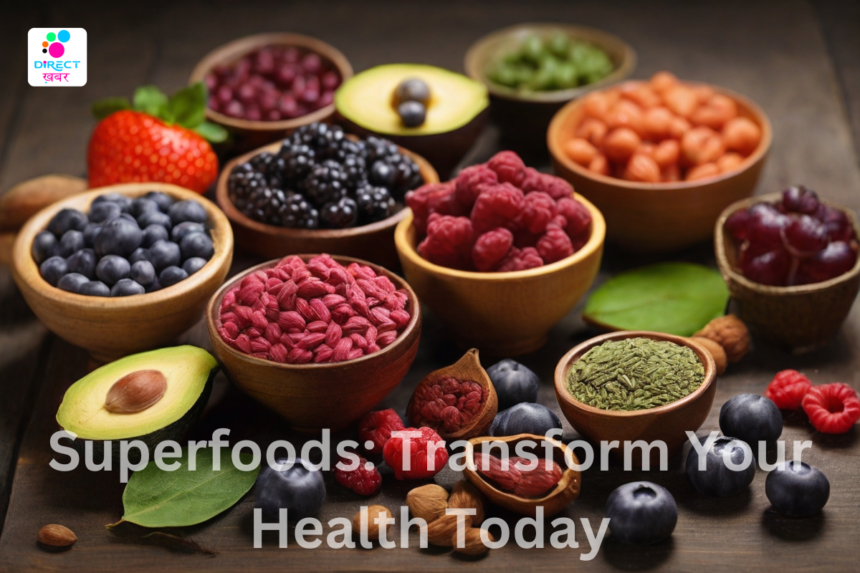The Power of Superfoods
In our quest for optimal health and wellness, the concept of “superfoods” has emerged as a beacon of nutritional excellence. These nutrient-dense foods are packed with vitamins, minerals, antioxidants, and other essential compounds that can have profound effects on our well-being. From boosting immunity to supporting heart health and beyond, the power of Nutritious food is undeniable. In this comprehensive guide, we’ll explore a variety of Superfood, their health benefits, and how you can incorporate them into your diet to transform your health and vitality.

Berries:
Berries are nature’s antioxidant powerhouses, bursting with vitamins, minerals, and phytochemicals that promote health and longevity of superfoods. From strawberries and blueberries to raspberries and blackberries, each variety offers its own unique set of benefits.
- Strawberries: Rich in vitamin C, fiber, and antioxidants, strawberries support immune function, aid in digestion, and promote skin health.
- Blueberries: Packed with anthocyanins and flavonoids, blueberries are known for their anti-inflammatory and brain-boosting properties, helping to improve memory and cognitive function.
- Raspberries: High in fiber and ellagic acid, raspberries support heart health, regulate blood sugar levels, and may even have anti-cancer effects.
- Blackberries: Loaded with vitamin K, manganese, and antioxidants, blackberries promote bone health, reduce inflammation, and support healthy aging.
Incorporate berries into your diet by adding them to smoothies, yogurt, oatmeal, or enjoying them as a standalone snack.
Leafy Greens:
Leafy greens like spinach, kale, Swiss chard, and collard greens are nutritional powerhouses packed with vitamins, minerals, and phytonutrients. These nutrient-dense greens are low in calories and high in fiber, making them ideal for weight management and overall health.
- Spinach: Rich in iron, magnesium, and vitamin K, spinach supports bone health, muscle function, and energy production. It’s also high in antioxidants like lutein and zeaxanthin, which promote eye health.
- Kale: A nutrient powerhouse, kale is loaded with vitamins A, C, and K, as well as calcium, potassium, and folate. It’s known for its anti-inflammatory and detoxifying properties, making it a staple in any healthy diet.
- Swiss Chard: Packed with vitamins A, C, and K, as well as magnesium and potassium, Swiss chard supports bone health, heart health, and immune function. Its colorful stems add visual appeal and additional nutrients to any dish.
- Collard Greens: High in vitamins A, C, and K, collard greens promote eye health, immune function, and bone health. They’re also rich in fiber, which supports digestive health and helps regulate blood sugar levels.
Incorporate leafy greens into your diet by adding them to salads, soups, stir-fries, or smoothies.
Nuts and Seeds:
Nuts and seeds are nutritional powerhouses rich in healthy fats, protein, fiber, vitamins, minerals, and antioxidants. Incorporating a variety of nuts and seeds into your diet can have a multitude of health benefits, from reducing inflammation to supporting heart health and cognitive function.
- Almonds: Rich in vitamin E, magnesium, and monounsaturated fats, almonds support heart health, brain function, and skin health. They’re also a good source of protein and fiber, helping to keep you feeling full and satisfied.
- Walnuts: High in omega-3 fatty acids, antioxidants, and polyphenols, walnuts support brain health, reduce inflammation, and promote heart health. They’re also rich in protein and fiber, making them a satisfying snack option.
- Chia Seeds: Packed with omega-3 fatty acids, fiber, protein, and antioxidants, chia seeds support heart health, digestive health, and blood sugar regulation. They’re also highly versatile and can be added to smoothies, oatmeal, yogurt, or used as a thickening agent in recipes.
- Flaxseeds: Rich in omega-3 fatty acids, fiber, and lignans, flaxseeds support heart health, digestive health, and hormone balance. They’re also known for their anti-inflammatory properties and may help reduce the risk of certain cancers.
Incorporate nuts and seeds into your diet by adding them to salads, oatmeal, yogurt, or enjoying them as a standalone snack.
Whole Grains:
Whole grains are an essential component of a healthy diet, superfoods providing a rich source of fiber, vitamins, minerals, and antioxidants. Unlike refined grains, which have been stripped of their nutritious bran and germ layers, whole grains retain all of their natural goodness.
- Quinoa: A complete protein, quinoa is rich in fiber, iron, magnesium, and antioxidants. It’s also gluten-free and easy to digest, making it an ideal grain for those with gluten sensitivities or digestive issues.
- Brown Rice: A staple in many cuisines, brown rice is rich in fiber, vitamins, and minerals, including magnesium, phosphorus, and selenium. It’s also a good source of energy and can help regulate blood sugar levels.
- Oats: High in soluble fiber, oats help lower cholesterol levels, regulate blood sugar levels, and promote digestive health. They’re also a good source of vitamins, minerals, and antioxidants, making them a nutritious breakfast option.
- Buckwheat: Despite its name, buckwheat is not a wheat grain and is gluten-free. It’s rich in protein, fiber, vitamins, and minerals, including magnesium, copper, and manganese. Buckwheat is also a good source of antioxidants and superfoods which may help improve heart health and blood sugar control.
Incorporate whole grains into your diet by swapping refined grains for whole grain alternatives like quinoa, brown rice, oats, and buckwheat.
Fatty Fish:
Fatty fish like salmon, mackerel, sardines, and trout are rich in omega-3 fatty acids, which are essential for heart health, brain function, and overall well-being. Incorporating fatty fish into your diet on a regular basis can have numerous health benefits.
- Salmon: Rich in omega-3 fatty acids, protein, and vitamin D, salmon supports heart health, brain function, and bone health. It’s also a good source of antioxidants, including astaxanthin, which may help reduce inflammation and protect against chronic diseases.
- Mackerel: High in omega-3 fatty acids, protein, and vitamin D, mackerel supports heart health, brain function, and immune function. It’s also a good source of selenium, which has antioxidant properties and may help protect against oxidative stress.
- Sardines: Packed with omega-3 fatty acids, protein, and calcium, sardines support heart health, bone health, and muscle function are some of superfoods. They’re also a good source of vitamin B12, which is essential for energy production and nerve function.
- Trout: Rich in omega-3 fatty acids, protein, and vitamin D, trout supports heart health, brain function, and immune function. It’s also a good source of potassium, which helps regulate blood pressure and fluid balance in the body.
Incorporate fatty fish into your diet by grilling, baking, or broiling them and serving them with a side of vegetables and whole grains.
Nutritious food are nutritional powerhouses that can have a profound impact on our health and well-being. From






